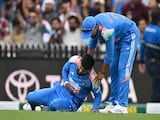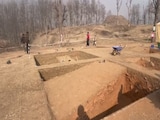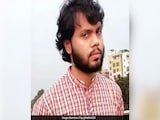August 15, 2022. Seventy-five years of India's independence. Har Ghar Tiranga. The country heard the Prime Minister wax eloquent in his address from the Red Fort about his inner feelings of distress when women are insulted, about the need to preserve the dignity of women, of "Nari Shakti" and so on. "Who can I share these thoughts of distress with, if not with you, my fellow citizens?" he asked.
On that very same day, 11 criminals, convicted and sentenced to life imprisonment for the most heinous crimes of gang-rape and murder in the Bilkis Bano case, walked out of a jail in Gujarat, courtesy the government. Is this the way to develop "Nari Shakti" and protect the dignity of women? To understand the enormity of the injustice of this order, we need to go back twenty years.
The convicts were greeted with sweets outside Godhra jail
March 3, 2002. Gujarat. Near Randhikpur village in Dohad district. A group of 17 men and women in a truck are fleeing for their lives. They are being hunted down by men in jeeps. The truck is stopped. A pregnant woman carrying her 3-year-old daughter is trapped by the hunters. Her child is torn away from her arms and smashed to the ground. The child dies before her mother's eyes. The woman is gang-raped. Her sister and cousin are with her. One of them had given birth just a few days earlier. They too are gang-raped. The new-born baby is killed. Fourteen of the group are butchered. She is left for dead, but she survives. She is reunited with her husband who was elsewhere on that day. At first, she cannot speak. But with immense personal courage, she transforms from a victim to a survivor, and from a survivor to a fighter. She knows and identifies the perpetrators of the crime.
But she finds that at every step of her fight for justice, the government is supporting the men who raped her, who had killed her family. The FIR is manipulated; the medical reports and post-mortem of the bodies omit important details of injuries; evidence is destroyed as all the dead are buried by the police themselves; the body of her 3-year-old disappears; the prosecution sides with the accused; the lower court hearing her case upholds all the falsehood and the lies. The case is closed. She perserveres.
The National Human Rights Commission receives her petition and conducts its own inquiry and supports her case. She appeals to the Supreme Court. In 2004, the case is reopened and referred to the CBI. It is later transferred to the Mumbai High Court from Gujarat as the top court upholds her plea that justice could be subverted given the pressure of a hostile environment. 12 of the 20 accused are arrested. She is the only direct witness. She is constantly under threat. She has no fixed address, moving from one place to another. In 2008, the Special Court sentences 11 accused (one died during the trial) to life imprisonment, but exonerates the police and doctors who were accused of being complicit in fudging reports. In May 2017, on an appeal from the CBI, the Mumbai High Court upholds the sentencing and also finds the doctors and police guilty. She has mixed feelings.
Bilkis Bano (File photo)
In that same week, in another case of gang-rape, a case named as "Nirbhaya", a court sentences the gang-rapists to death. Why not in her case? Are these not double standards? In 2019, the Supreme Court awards her compensation of 50 lakh rupees, a government job and a house. The Gujarat government gives her the money under court orders, but neither the job nor the house. Yet, she sees the possibility of rebuilding her life.
Then, on August 15, 2022, she, Bilkis Bano, learns that the criminals are free men. She is back to the nightmare of 20 years ago.
A debate has started about the legality of the procedure adopted by the Gujarat government to release the convicts. The Supreme Court in May this year, hearing a petition from one of the accused, had held that granting remission lay with the Gujarat State government. It also said that it should go by the 1992 policy for remission which was in place when the conviction was made. According to the explanation of the Gujarat government, since these guidelines did not specify any exemptions to the remissions, such as against rapists or murderers, the release of the convicts is legal.
This is absolute nonsense. Firstly, remissions after 14 or 15 years of being in jail on a sentence of life imprisonment is not an automatic right. There is nothing legally binding on the government to release the convicts. This has been made clear by the Supreme Court in several judgements. Secondly, from the moral and ethical point of view, the Gujarat Government itself had in its revised guidelines for remission, issued in 2014, very specifically (in Clause IV (c) Annexure1) excluded those convicted of rape, gang-rape, and murder. In 2018, the central government had in its amnesty guidelines for prisoners on the occasion of the 150th birth anniversary of Mahatma Gandhi excluded those serving life sentences after being convicted for gang-rape or murder. This was repeated in the guidelines issued by the Home Ministry under remission for prisoners as part of the Amrit Mahotsav celebrations. So it is agreed by both the central and Gujarat governments that to grant remission to convicted rapists is wrong. As made clear in the recounting of the Bilkis case, what was committed was a most heinous crime - described in so many words by the court that convicted them, yet they were released.
Another question arises. The investigation of the case was by the CBI agency directly under the central government. Under Sec 235 (1) (a) of the Criminal Procedure Code, in the case of an investigation done by any agency under a central Act, as governs the CBI, the state government has to "consult" the central government before a decision of remission. In this case, was the central government consulted? The Home Ministry should make it clear. If it was not, will Amit Shah and the Home Ministry intervene? The order must be rescinded.
But even though all these questions have relevance, let us not fool ourselves into believing that this is about legal provisions and whether procedures have been followed. It's not about law, but about votes, about politics - a particular brand of politics. Suppose for a minute the name of the woman was not Bilkis Bano. Suppose she was Jyoti? Suppose the rapists and murderers were not Shailesh or Radheyshyam but Afzal or Yunus, would the Gujarat government have granted them remission? Obviously not. The Gujarat election is scheduled a few months from now. Two of the members of the committee which recommended remission are local BJP MLAs. So is this what is at play - the Gujarat model of spreading hate and division, of communal polarisation. When punishment of a crime like gang-rape is linked to communal considerations, as this remission shows every sign of, it is a direct blow against "Nari Shakti" and women's dignity. Perhaps the PM could note this - and Amit Shah could actually act on it.
(Brinda Karat is a Politburo member of the CPI(M) and a former Member of the Rajya Sabha)
Disclaimer: These are the personal opinions of the author.















